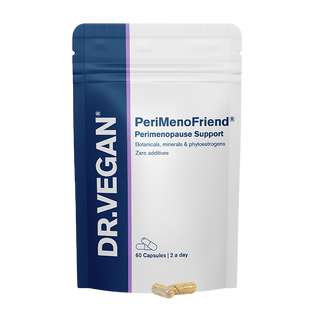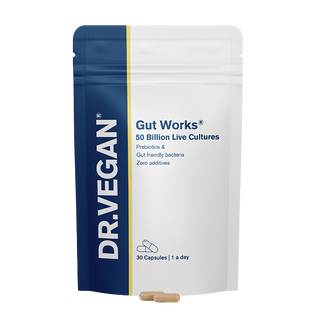How menopause affects gut health

The gut microbiome plays a significant role in so many aspects of our health, from our immune system, mental health, metabolism and skin health to our endocrine system and hormones. In fact, the gut microbiome is referred to as an organ because of its role in facilitating so many daily functions in the body. Dr. Katherine Hodgkinson, a GP and lifestyle medicine doctor specialising in menopause, and founder of Hampshire Health & Hormones, explains how the gut microbiome changes during menopause and how to support a healthier gut microbiome during menopause.
What is the gut microbiome?
The gut microbiome consists of the trillions of microorganisms and their genetic material that live in our digestive system, particularly in the 'caecum' in the intestines. The caecum is the first region of the large intestines and receives undigested food from the small intestines.
What's your diet missing? Create your free Diet Profile.
Everyone has their own unique microbiome, and we all have unhealthy microbes and healthy microbes. Different healthy microbes have been shown to have different roles within the body, including supporting the metabolism of food and the absorption of nutrients, the synthesis of certain nutrients, supporting the immune system and to help protect against pathogens and free radicals. This is why it is important to have a good diversity and balance of healthy microbes for different functions in the body. An imbalance of good and bad microbes has been linked to certain diseases, in particular autoimmune diseases, including thyroid disease.
Menopause hormones and gut health
Research shows there is a relationship between sex hormones and the gut microbiome, and vice versa.
Hormones affect gut health
One study has shown there is a profound change in the gut microbiome in women in their third trimester of pregnancy, when oestrogen levels are at their peak. Another study has found that the gut microbiome of post-menopausal women, when oestrogen levels are low, is similar to that of males. These and other studies indicate that oestrogen, in particular, plays a significant role in the composition of the gut microbiome and that fluctuations of oestrogen can impact the gut microbiome. While there is a lot of talk about the gut microbiome, research into the human microbiome is a very understudied area and more research is required.
PeriMenoFriend®

Gut health affects hormones
Gut health affects the balance of hormones, including the regulation of oestrogen levels. Oestrogen is initially metabolised through the liver before being converted into a form that can be excreted via the stools and urine, which is important to regulate oestrogen levels. There is a group of microbes in our gut microbiome that produce an enzyme called 'beta-glucuronidase', which supports the regulation of oestrogen levels.
When the gut microbiome is balanced, optimal amounts of this enzyme are produced. However, when there is an imbalance of these microbes, there can be an increase in microbes producing beta glucuronidase, which in turn, can lead to higher reabsorption of oestrogen and higher levels of oestrogen circulating in the bloodstream. This has been linked with conditions like endometriosis, fibroids, obesity and PMS symptoms including bloating, breast tenderness and mood changes.
Significant changes in sex hormone levels occur during the peri-menopause, in particular oestrogen, which can fluctuate markedly and then decline as menopause approaches. Due to the reciprocal link between oestrogen and gut health, an imbalance in the gut microbiome can impact oestrogen levels, which in turn may trigger or exaggerate the symptoms of menopause. Furthermore, changes in oestrogen levels during menopause can alter the whole composition and balance of the gut microbiome.

Discover our Menopause Hub | Resources to help support women through all stages of menopause.
How to support a healthier gut microbiome through menopause
Diet and lifestyle have a significant impact on the gut microbiome and hormone balance. Poor diet, anxiety and stress, a lack of quality sleep, and a sedentary lifestyle can lead to an imbalance of gut microbes, which is linked to inflammation and an increased risk of gut disease. It can impact hormone balance and is linked to a host of different diseases.
Here are 9 tips on getting your gut microbiome into a better place during menopause through your diet:
1. Cut out unhealthy foods and drinks
Some foods feed the bad bacteria in your gut or affect the good bacteria, therefore impacting your gut health and potentially contributing to inflammation. Foods to avoid include refined sugar, processed foods, artificial and plant sweeteners, alcohol, refined grains, processed meat or too much red meat, refined oils and fried foods.
2. Eat a wide range of plant foods
Research has shown that people who eat more than 30 different plant foods per week (for example, different fruits, vegetables, nuts, seeds, pulses and wholegrains) have a greater diversity of microbes in the gut compared to those that eat 10 or fewer different varieties. Having lots of different colours on the plate offers more phytonutrients, which are so important to the gut microbiome.
3. Prebiotic foods
Prebiotic foods can act as fertilisers for the gut, feeding and supporting the growth of good gut microbes. Prebiotics are typically high-fibre foods that the body cannot digest, so they bypass digestive processes and travel to the colon. When in the colon, they are metabolised by the gut microorganisms, which produce short-chain fatty acids. This process supports a healthy metabolism, helps reduce inflammation and supports the immune system. Good examples of prebiotic foods are garlic, bananas, Jerusalem artichoke, legumes, oats and wholegrains. Some people are unable to tolerate prebiotics, which can result in gut health issues.
4. Polyphenols
Polyphenols are plant compounds with antioxidant properties that have prebiotic effects and have been shown to help inhibit the growth of bad microbes. Good foods with polyphenols include berries, nuts, seeds, beans and olives.
5. Wholegrains
Wholegrains help to give bulk to the stools; they're a good source of fibre and they help feed the good microbes in the gut. Good wholegrains include rice, corn, oats and bulgar wheat.
6. Fermented foods
Fermented foods contain live bacteria which are a source of probiotics. These good probiotics help to add healthy microbes to the gut and support the diversity of the gut microbiome. Good examples of fermented foods providing probiotics include kefir, kimchi, kombucha and sauerkraut.
7. Reduce stress
Stress has a huge impact on our wellbeing and can also affect hormone balance and gut health. Getting to the root cause of stress is important to help manage it. Sharing the mental load, meditation, mindfulness, time out, regular breaks and being kind to yourself can support this, together with seeking professional help if required.
8. Regular exercise
Just as a sedentary lifestyle has been linked to changes in the gut microbiome, so can overdoing it, so moderation is key. Regular gentle-to-moderate exercise and muscle-strengthening exercises can be helpful for overall gut health and ensuring regular stools.
9. Sleep
Too often overlooked, a good night’s sleep is so important to repair and reset our bodies. Poor sleep can create stress, which can impact hormones and gut health. Regular bedtime routine, not eating late at night, no screen time before bed and relaxation at bedtime are some ways to support this. Sleep can often be affected by changes in hormones at the time of menopause and addressing the management of menopause symptoms can help with sleep problems.
Other articles you may enjoy:
- Nutrition for the menopause
- Why exercise helps through menopause
- Can menopause cause anxiety and mood swings?
- Mental health effects of menopause
- Attitudes towards menopause around the world
Want to hear more from our experts? Sign up to our newsletter for free expert tips and advice:


















